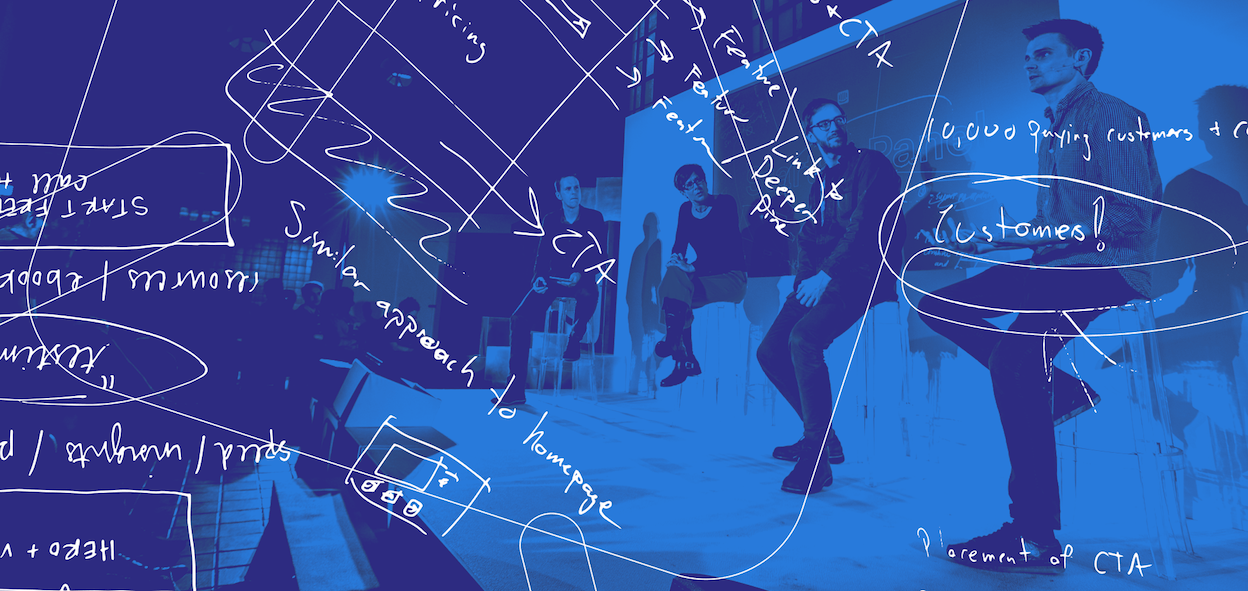
Inside Intercom London startup panel
What qualities make for a great product?
At the first stop of our Inside Intercom World Tour, in front of a sellout crowd at The Boiler House in London, I hosted a panel of local startup founders to get to the bottom of this very question. Our panelists include:
- Bridget Harris, CEO and co-founder of You Can Book Me, software that allows customers to schedule time on your calendar online.
- Will Swannell, CEO and co-founder of Hire Space, which has become the UK’s leading venue hire site.
- James Blackwell, co-founder of Buzz Sumo, a search engine that lets users analyze trending content and influencers on social networks.
It’s a lively chat that touches on how to begin pricing, the difficulties of hiring, the pros and cons of taking funding, and making sure our products solve real customer problems.
Check out our full list of upcoming European and US tour dates and tickets. To hear more podcast episodes, subscribe on iTunes, Stitcher, or SoundCloud, or grab the RSS feed.
Prefer a written account of the panel? You’ll find a few of our favorite insights below the embed.
Where to begin with pricing
James: We started at $99/month, and a lot of people looked at us like we were crazy – thinking more $10-20/month. But we haven’t had any difficulty growing with that price point, and I often feel like we’ve underpriced. Generally, lean for the highest end of what you think you can get away with, and then add a bit on.
Will: Increasing your prices when you realize you’ve underpriced is a very difficult thing to do. Coming down (in price) is pretty easy, everyone loves that, but moving up is quite difficult.
Bridget: At the beginning we gave our product away for free. In retrospect, I probably would have done that very differently. It’s more complicated than just giving something away and hoping that people will just come along, grow your product, and then sneakily charging for a few features. You end up undervaluing your own product, and the consequence is having to justify why you have to put your prices up.
Will: Simplicity is really, really important. We launched with a variable commission with venues. It was very difficult to communicate. If you can’t answer the question, “how much does it cost?”, with no more than two words, then it’s probably too complicated.
Finding success in hiring
Will: Early on it’s quite easy not to value the importance of HR and the skill that goes into finding the right people for your company. As we’ve grown it’s something that we’ve learned. Looking back, I wish we valued that side more.
Bridget: We chose to be a remote company. If you’re in the middle of London, it’s great, but we’re actually based north of London. We weren’t going to convince everybody to come to our office in Bedford. So, we now hire remotely, which opens up our hiring pool.
When you’re hiring, you have two outcomes – hire, or no hire. I see it much more as a process of elimination, rather than selection. Essentially I’m finding reasons not to hire somebody, and you don’t make the mistake of hiring somebody that you didn’t think was quite right, but was maybe going to be okay in six months time with the right kind of training.
Bringing in sales and marketing
Will: One of the things we would have done earlier is look at our sales process. Obviously you need a great product and a great marketing team. But having a culture inside the company that is really treating every interaction as a sales opportunity is something that has helped us grow.
Sales can be quite a dirty word sometimes. I’ve seen people fall into the trap of just wanting to build something that’s beautiful, but not thinking about actually making sure that people part with their money and buy it.
James: You need to have some sort of marketing or distribution plan in mind when you start. Ensure you have the market in mind for whom you’re building the product for. It goes back to making sure you’re building something that actually people want.
Funding: To raise, or not to raise?
Will: What’s most attractive about crowd funding is not the money itself. It’s about building a community of people who have really bought into your product. If those are your users, they feel like part of your journey.
Bridget: The VC funding route is probably the only option for certain types of business, where you need a lot of upfront capital. But it will change your business plan. It does change your priorities. And it will start to set a direction, because you’ve got investor expectations on the table.
Managing customer acquisition
Will: Make sure you’re measuring (customer acquisition) and measuring it effectively. An acquisition channel for me will be completely different for you, but if you’re able to measure each interaction a customer gives you all the way through to profit, that’s what’s important.
James: It goes back to making sure the product actually does something that somebody is willing to pay for. Maybe it only applies in the vis-a-vis product space, but if you’re helping somebody do part of a job, there’s a high chance somebody’s going to pay for that. Tie everything back to how this is actually going to help somebody get stuff done.
Bridget: If you find yourself bending over backwards to convince one person to pay for your product – it only happened because you went around their house, made them tea, and took them through the instruction leaflet of your product – they’re probably not the customer that is scalable. You need to find customers who are repeatable, and who are repeatable with less effort every time you want to grow.
What makes a great product?
Will: Something that people talk and tell their friends about. That makes one customer, an instant customer. If that’s happening, you nailed it. And if it’s not, then you need to improve.
James: When things just work. When you use a product and something doesn’t work as expected, and you just feel frustrated, that’s not a great product. When you’re surprised, that is something you don’t have to do, because it’s been done for you. Those little moments of delight are what make a great product.
Bridget: Know what problem you’re solving. If you can describe the problem in a couple of words, you are going to find people who absolutely love your product. And they’ll thank you for it and they’ll thank you by paying you for that solution, which is a great feeling. When people say, “You’ve changed my life” because of the product you have given them, you’ve managed to nail the solution to their problem.








